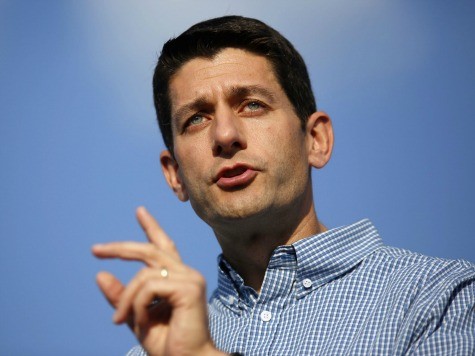When Mitt Romney selected Paul Ryan to be his running mate, the mainstream media last week warned Republicans against the dangers of discussing Medicare. Democrats could not contain their excitement, because they believed a discussion about Medicare would doom the Republican ticket.
But a funny thing has happened after Romney and Ryan ignored the mainstream media’s conventional wisdom.
By taking the Medicare fight to President Barack Obama and Democrats, Ryan put the Obama campaign on defense last week. Romney and Ryan will campaign in New Hampshire on Monday, and they will do so days after a defensive Obama campaigned in the Granite State and tried to painstakingly defend his Medicare record.
Last Wednesday, at Miami University of Ohio, Ryan took the Medicare fight straight to Obama.
“We want this debate,” he said. “We need this debate. And we will win this debate.”
Ryan’s comments were important because, unlike after the Romney campaign’s response on Romney’s taxes or the Supreme Court’s Obamacare ruling, Republicans were all on the same page in taking the Medicare fight to Obama.
Republicans attacked Obama for not having a plan to keep Medicare solvent and taking over $700 billion from Medicare to fund Obamacare.
The Obama campaign then immediately ran a reactive and defensive advertisement about Medicare. In the ad, a narrator says “Mitt Romney’s attacking the president on Medicare” and cites the “nonpartisan AARP” in defending Obama’s actions on Medicare.
AARP Senior Vice President John Hishta immediately issued a statement in which he distanced himself from the ad the Obama campaign hastily put on the air, blanketing the airwaves in nearly all of the swing states.
“We were not aware of nor have any involvement with this campaign ad,” Hishta said. “AARP is a nonpartisan organization and we do not endorse political candidates.”
And this weekend in Florida, Ryan, campaigning with his mother, recounted an emotional story about how his grandmother — who had Alzheimer’s — moved in with him and his mom when Ryan was in high school.
“My mom and I were her two primary care givers,” Ryan said. “You learn a lot about life. You learn a lot about Alzheimer’s. And Medicare was there for our family, for my grandma when we needed it then. And Medicare is there for my mom while she needs it now. And we have to keep that guarantee.”
Ryan argued that “Medicare should not be used as a piggybank for Obamacare,” and reiterated that “Medicare should be the promise that is made to our current seniors period, end of story.”
“Our plan does not affect the benefits for people who are in or near retirement,” Ryan said. “It’s a promise that was made, and it’s a promise that must be kept.”
Ryan said his mom, a “snowbird” who lives in Florida during the winter, planned her retirement around Medicare and so the issue is not something that is neither abstract nor foreign to him.
“[Obama] puts a board of board of 15 unelected, unaccountable bureaucrats in charge of Medicare who are required to cut Medicare in ways that will lead to denied care for current seniors,” Ryan said. “We will make sure that this board of bureaucrats will not mess with my mom’s healthcare or your mom’s healthcare.”
Ryan also mentioned that the idea of “premium support,” which is a part of his plan for reforming Medicare for those under 55 years of age, originated during the Clinton administration.
Since Obama came into the White House, the mainstream media — and Democrats — have often overestimated the degree to which Obama would be liked or how various policy issues would hurt Republicans. When Obama had sky-high approval ratings in 2009, the mainstream media warned Republicans against the dangers of opposing the policies of such a popular president. During the Obamacare debate, the mainstream media and Democrats again warned Republicans against becoming, in their words, “the party of ‘no.'” And when Republicans ignored the mainstream went on the offense — in large part because of the Tea Party — against Obama and Obamacare and won historic gains in the 2010 midterm elections.
This time, the conventional wisdom was that discussing Medicare would hurt Romney and Ryan the most in Florida. Yet last week, Romney led Obama in Florida in two polls the week after Romney chose Ryan as his running mate and a poll conducted by Purple Strategies showed that in the four states the organization polled — Florida, Ohio, Colorado and Virginia — Ryan’s and Romney’s views on Medicare fared the best in Florida. Florida’s seniors are more conservative than seniors in other states and, in 2010, Marco Rubio won half of Florida’s seniors even though he spoke about reforming Medicare and Social Security during his campaign. If Medicare turns out to be a net negative for Romney and Ryan in Florida, it will most likely not hurt the ticket more in Florida than it will in other states, if that is even the case.
When Ryan and Romney’s first joint interview aired on CBS’s “60 Minutes,” the network cut from its primetime broadcast a clip in which Ryan spoke about how his mother was a Florida resident who was on Medicare. Perhaps, despite their protestations to the contrary, the mainstream media knew that discussing Medicare — especially when Obama and Democrats have no plan to make Medicare solvent — would not hurt Romney and Ryan as much as they publicly said it would.
By not ceding the Medicare fight to Obama — and the mainstream media — Ryan and Romney enter this week facing an Obama campaign that suddenly finds itself on the defensive on an issue that is supposed to be on its strongest.

COMMENTS
Please let us know if you're having issues with commenting.